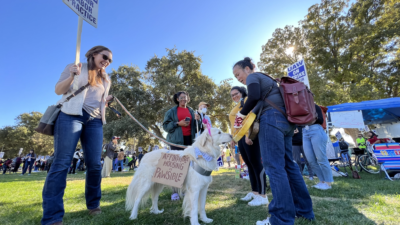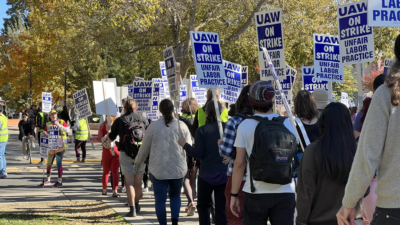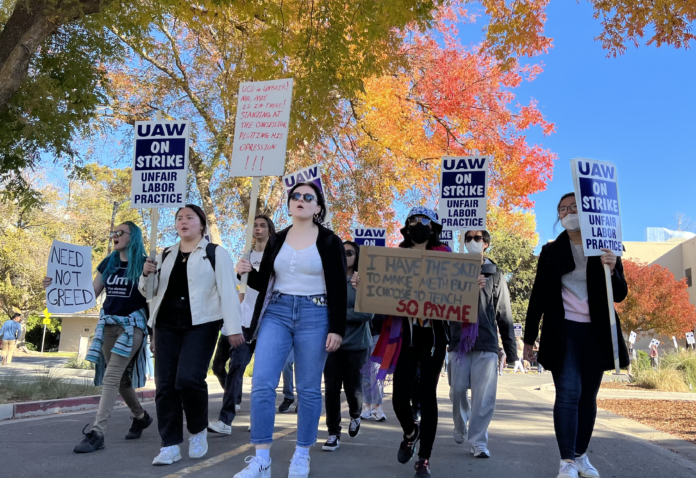Unions representing teaching assistants, student researchers, academic researchers and postdoctoral students authorized the strike began on Monday
By SYDNEY AMESTOY — campus@theaggie.org
On Nov. 2, unions representing graduate students, teaching assistants, student researchers and postdoctoral scholars authorized a strike at all 10 UC campuses — the largest academic strike in the history of U.S. higher education. The strike officially began on Monday, with many academic workers ceasing to perform work duties related to teaching and research and instead joining picket lines across campuses to increase the visibility of the strike.

On the first day of the strike, picketers blocked the intersection of Hutchinson and La Rue Rd., and lined the entrance to campus on Howard Way holding a sign that read, “Strike Means Strike: Undergrad Solidarity.”
The unions, United Auto Workers (UAW) 2865, Student Researchers United (SRU-UAW) and UAW 5810, are asking for a significant pay increase from about $24,000 to $54,000, annually. This demand is in response to the rising cost of living throughout California, as 92% of graduate workers in the UC system are currently rent-burdened, meaning that more than 30% of their salary goes toward rent each month.
Other demands include sustainable transit benefits, smaller class sizes, equity for international scholars, disability justice and childcare benefits for working parents.
As a result of the strike, there have also been disruptions to the Unitrans Memorial Union bus terminal, and according to the Unitrans website, these delays and temporary suspensions are expected to continue during picket line hours for the duration of the strike.
The UC Student Body Presidents released a joint statement in solidarity with UAW on Monday, signed by the student body presidents of UC Berkeley, UC San Diego, UC Santa Barbara, UC Riverside, UC Merced, UC Los Angeles and UC Davis.
“We acknowledge that our academic experience as students may be impacted,” the letter reads. “However, we stand in full support of actions such as class cancellations, delayed grading, and the absence of feedback on work in order to stress the importance of our workers, researchers, postdocs, teaching assistants, and graders. […] Our union colleagues’ working conditions are our learning conditions.”
Thirty-three members of the California Legislature also released a letter of support for academic workers, urging the UC to bargain in good faith with UAW in order to support student workers and avoid further disruption to the education of UC students.
“Their talent, innovation, and labor contributes greatly to the University’s mission and its ability to secure funding,” the letter from the California Legislature states. “The UC is one of the top public university systems and research institutions in the world, in no small part because of its ability to attract the most talented scholars from a wide array of backgrounds. But the UC system cannot live up to its mission and reputation if its own employees do not feel respected.”
According to UAW 2865, strike authorization votes in which union members decided whether or not to authorize a legal strike were held on UC campuses between Oct. 26 to Nov. 2. A total of 36,558 union members voted, with 98% agreeing to authorize a strike, according to the Fair UC Now website. These votes came after many meetings with UC administrations that failed to achieve the unions’ desired goals.
Representatives of the unions at UC Davis held a celebratory event on the night of the authorization vote results, during which they spoke about their demands on behalf of the student workers they represent.
“The negotiations leading up to [the strike authorization] have been repeatedly stalled or undermined by the University of California,” said Diana Sernas, who has been part of the negotiation process with UC Davis administration on behalf of UAW 2865. “We find the UAW has filed over 20 [reports of] unfair labor practices at the bargaining table.”

According to the Fair UC Now website, the unions’ demands have historically sought legal protection from bullying practices in the workplace. Negotiations about legal protection from bullying reached a tentative agreement in August according to Neal Sweeney, the president of UAW 5810, which represents UC postdoctoral students and academic researchers.
“[Bullying] is a big problem, particularly in research fields and in academia due to the power dynamics,” Sweeney said. “Usually the professor holds a lot of power over people’s lives and careers. The university had broken the law by refusing to bargain on this topic, which we felt [constituted] unfair labor practices.”
While negotiations for this demand were successful, other core demands have not been met. These include pay increases, childcare benefits, international scholar rights and transit incentives.
“One example of a sustainable transit incentive that the UC could provide would be a subsidy for purchasing a bike, because Davis is a very bike-friendly town, and it is very cumbersome to drive,” Sernas said.
The strike authorization comes out of a collaboration between the three previously mentioned unions, which is historically notable according to Ximena Anleu-Gil, who is on the bargaining team for SRU-UAW.
“It’s very important that [the three unions] could align all of our bargaining,” Anleu-Gil said. “[There are] 48,000 workers actually in negotiations with the university, and [we’re] working very closely together. Our demands were very much in coordination so that we could have a unique power.”
As the strike authorization vote took place and before the strike began, Michael Brown, the provost and executive vice chancellor for academic affairs for UC Office of the President, sent out an email to faculty members with an update on the university’s position.
“The University and the Union remain far apart on some […] key issues not related to economics,” the email reads. “The union is taking a strike vote across all four bargaining units. In the meantime, the University is taking active steps to prepare for work stoppage, while also continuing to bargain in good faith with the Union.”
Picket lines are on Russell Blvd. and Howard Way, as well as Hutchison Drive and La Rue Rd., from 9 a.m.-1 p.m. and from 12-4 p.m. for the remainder of the strike.
Kaya Do-Khanh and Sonora Slater contributed to this report.
Editor’s Note: This story is developing. Check back for updates. Last updated: Nov. 15, 4:30 p.m.
Written by: Sydney Amestoy — campus@theaggie.org











